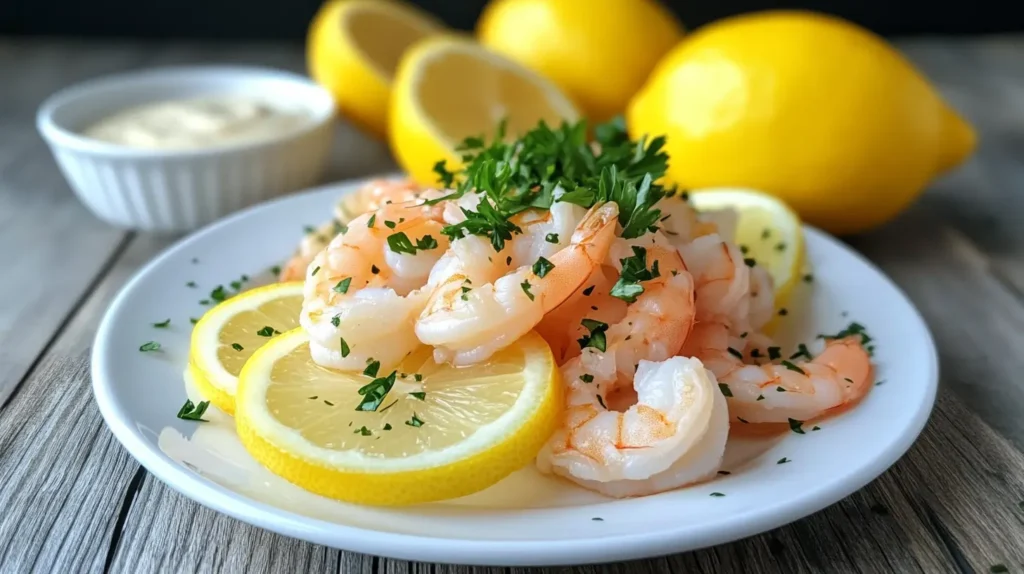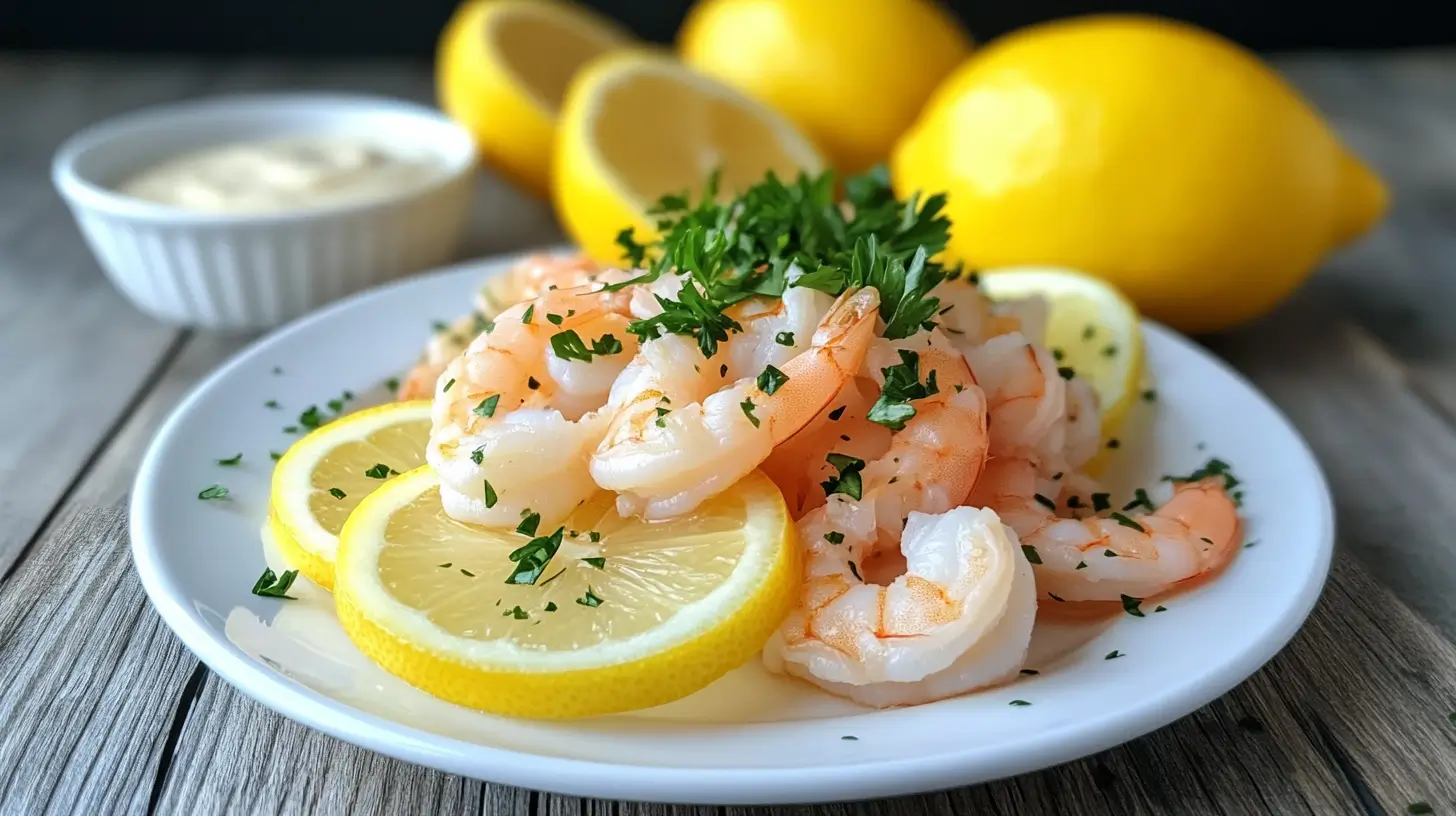Lemon and shrimp—two ingredients that are almost inseparable in the culinary world. Whether it’s a simple shrimp cocktail, a sizzling garlic butter shrimp dish, or a hearty shrimp pasta, lemon seems to find its way onto the plate. But have you ever wondered why lemon is so often paired with shrimp? What makes this citrus fruit such a star in seafood preparation, and what exactly does it do to shrimp?
In this article, we’ll dive into the chemistry, culinary uses, and common challenges of pairing shrimp cooking. We’ll also explore tips, benefits, and even solutions to ensure your shrimp dishes are always a hit. By the end of this guide, you’ll know everything about how lemons enhances shrimp and why this dynamic duo is a favorite across the globe.
The Popularity of Lemon in Seafood Preparation
Seafood has a distinct flavor profile that often needs a balancing agent, and lemon fills this role beautifully. With its tangy, zesty taste, lemons cuts through the rich, briny flavors of shrimp and other seafood. Lemon also provides a bright freshness that complements shrimp’s delicate texture.
But it’s not just about taste—lemon adds a visual and aromatic appeal that elevates dishes. The golden color of lemons zest or a drizzle of lemons juice over freshly cooked shrimp can make a dish feel gourmet, even when it’s simple.
“Lemon is like the punctuation in a seafood dish—it adds emphasis, clarity, and a finishing touch that makes all the difference.”

Key Characteristics of Shrimp and Lemon
To understand what lemon does to shrimp, we need to take a closer look at the characteristics of both ingredients:
Shrimp: The Star Protein
- Mild Flavor: Shrimp has a slightly sweet, subtle taste, which makes it a versatile base for a variety of flavors.
- Texture: Its tender yet firm texture allows it to absorb marinades and flavors well.
- Nutritional Value: Shrimp is rich in protein, omega-3 fatty acids, and essential vitamins and minerals.
Lemon: The Flavor Enhancer
- Acidity: Lemon’s high citric acid content is the key to its sharp, tangy flavor.
- Aroma: The oils in lemon zest provide a refreshing, citrusy aroma.
- Nutritional Benefits: Packed with Vitamin C and antioxidants, lemon adds a health boost to any dish.
The Science Behind Lemon’s Effect on Shrimp
Ever noticed how shrimp becomes more flavorful and tender when marinated or cooked with lemon? This is no coincidence—it’s science at work!
The Role of Citrus Acids in Cooking
Lemon juice is acidic, with a pH level ranging from 2 to 3. This acidity plays a significant role in breaking down proteins in shrimp, making them tender and easier to digest. The acid in lemon also interacts with the shrimp’s natural sugars, enhancing its flavor and creating a depth that’s irresistible.
How Lemon Enhances the Flavor of Shrimp
Lemon doesn’t just add sourness—it brings out the sweetness in shrimp by providing contrast. The citric acid in lemon acts as a flavor catalyst, amplifying shrimp’s natural taste while masking any fishy or briny undertones.
Breaking Down Proteins with Lemon Juice
The acid in lemons juice begins to “cook” shrimp in a process similar to ceviche. While this doesn’t replace heat-based cooking methods, it tenderizes the shrimp and infuses it with flavor. However, it’s important not to overdo it—too much acid can make the shrimp mushy.
Cooking with lemon is both an art and a science. Get the balance right, and it can transform your shrimp dish from ordinary to extraordinary.
Culinary Applications of Lemon and Shrimp
When it comes to combining lemon and shrimp in the kitchen, the possibilities are nearly endless. Lemon serves as a versatile ingredient that enhances shrimp dishes across cuisines, cooking methods, and presentation styles. Let’s explore how this dynamic duo works its magic in various culinary applications.
Lemon in Shrimp Marinades
Marinades are one of the most effective ways to infuse shrimp with lemon’s bright flavor. A good shrimp marinade combines acidity, fat, and seasoning to enhance flavor and tenderize the protein.
How Lemon Works in Marinades:
- Tenderization: Lemon’s acidity breaks down the shrimp’s outer proteins, resulting in a softer texture.
- Flavor Infusion: By letting shrimp sit in a lemons-based marinade for 20-30 minutes, the citrus flavor penetrates the surface, creating a zesty bite.
Popular Marinade Combinations:
- Lemon, garlic, olive oil, and parsley
- Lemon, chili flakes, honey, and soy sauce
- Lemon, dill, and Greek yogurt
Pro Tip: Avoid marinating shrimp in lemon for too long (more than an hour), as the acid can start to “cook” the shrimp and make it rubbery.
Cooking Methods Where Lemon and Shrimp Shine
Lemon pairs exceptionally well with various shrimp preparation techniques, each showcasing the citrus fruit’s versatility:
Grilled Shrimp with Lemon
Grilling shrimp with a squeeze of lemons creates a smoky, tangy flavor that’s hard to beat. Adding lemons slices directly to the grill can also infuse the shrimp with a subtle citrus aroma.
Sautéed Shrimp with Lemon Butter
This classic method combines lemon juice, zest, and butter in a quick sauté. The result? A rich, tangy sauce that coats the shrimp perfectly.
Baked Shrimp with Lemon and Herbs
Baking shrimp with lemons slices, garlic, and fresh herbs like thyme or rosemary creates a flavorful dish that’s as easy to make as it is delicious.

Popular Dishes Featuring Lemon and Shrimp
Lemons and shrimp feature prominently in some of the most beloved seafood dishes. Here are a few crowd favorites:
- Shrimp Scampi: A garlic-forward dish with a buttery, lemony sauce.
- Ceviche: A no-cook dish where shrimp is “cooked” in lemons and lime juice, mixed with onions, cilantro, and peppers.
- Shrimp Pasta with Lemons Cream Sauce: A decadent pasta dish featuring shrimp in a creamy, zesty sauce.
- Lemon Shrimp Skewers: A simple and delicious appetizer that’s perfect for summer grilling.
Lemon is the ingredient that bridges the gap between simplicity and sophistication in shrimp dishes.
Common Problems When Using Lemon with Shrimp
While lemons is a fantastic companion to shrimp, improper use can lead to culinary missteps. Let’s address some of the most common challenges and how to solve them.
Overpowering the Shrimp’s Natural Flavor
Shrimp has a delicate taste that can easily be overshadowed by too much lemon.
Solution:
- Use lemon sparingly in the marinade or sauce.
- Balance lemon’s acidity with fats like butter or cream.
- Add lemon juice gradually and taste as you go.
Excessive Acidity: How to Balance It
Using too much lemon juice can make a dish overly sour, leaving your taste buds puckering.
Solution:
- Counteract acidity with sweetness (honey, sugar) or richness (olive oil, cream).
- Pair lemon with complementary ingredients like garlic or herbs.
Timing: When to Add Lemon to Shrimp
Timing is crucial when working with lemon and shrimp. Adding lemon too early can result in texture issues.
Solution:
- Add lemon juice near the end of the cooking process.
- For marinades, limit the time shrimp spends soaking in lemon-based mixtures.
The secret to using lemon with shrimp is striking the right balance—enough to brighten the flavors, but not so much that it steals the spotlight.
Benefits of Lemon in Shrimp Dishes
Lemon isn’t just a flavorful addition to shrimp dishes—it also brings a host of culinary and health benefits. Its ability to enhance taste, improve texture, and boost nutritional value makes it a must-have ingredient in seafood recipes.
Flavor Enhancement and Freshness
One of lemon’s greatest strengths is its ability to amplify flavors. Its acidity cuts through the richness of shrimp, balancing out the dish and ensuring a well-rounded taste.
How Lemon Boosts Freshness
- Neutralizes Odors: Lemon juice helps eliminate the “fishy” smell often associated with shrimp, making it more appealing.
- Brightens Flavors: Even a small squeeze of lemon juice can elevate the taste of a dish, adding a clean, zesty note.
- Visual Appeal: Lemon slices or zest add a pop of color that makes any shrimp dish more visually appetizing.
Fun Fact: Chefs often refer to lemon as the “flavor lifter” for its ability to enhance other ingredients without overpowering them.
Nutritional Boost from Lemon
Lemon not only improves flavor but also contributes valuable nutrients to your shrimp dishes:
- Rich in Vitamin C: A natural immune booster that supports skin health and collagen production.
- Low in Calories: Lemon juice adds flavor without adding significant calories, making it ideal for health-conscious cooking.
- Antioxidant Properties: Lemon contains compounds like flavonoids that fight inflammation and oxidative stress.
Paired with shrimp’s protein and omega-3 content, lemon creates a nutrient-dense, guilt-free dish.
Preserving Shrimp with Lemon Juice
Lemons juice can also play a role in preserving shrimp during storage and preparation:
- Delays Spoilage: Lemon’s acidity creates an environment that slows bacterial growth, keeping shrimp fresher for longer.
- Preps Shrimp for Cooking: A quick soak in lemon water can firm up the shrimp’s texture and neutralize any unpleasant odors.
For another flavorful way to enhance your seafood or other dishes, check out What Is Taco Sauce? A Flavorful Guide. You’ll discover how versatile sauces and seasonings can transform your meals.
Tips for Perfectly Pairing Lemon with Shrimp
Using lemon effectively with shrimp requires a bit of finesse. These tips will help you strike the perfect balance every time.
Choosing the Right Lemon-to-Shrimp Ratio
Getting the ratio right is key to ensuring lemons enhances the shrimp without overwhelming it.
- Rule of Thumb: Use 1–2 tablespoons of lemons juice per pound of shrimp.
- Zest for Subtlety: If you prefer a milder lemon flavor, opt for lemon zest instead of juice.
Pairing Lemon with Other Ingredients
Lemon works beautifully with a range of flavors, but some combinations truly stand out:
- Garlic and Butter: Creates a rich, savory base with a hint of tanginess.
- Herbs: Basil, parsley, and dill complement lemon’s citrus notes.
- Spices: Paprika, cayenne, and black pepper add warmth to balance the lemon’s acidity.
Presentation Tips for Lemon and Shrimp Dishes
The way you use lemon can also elevate your dish’s presentation:
- Lemon Wedges: Serve alongside grilled or sautéed shrimp for a vibrant, interactive garnish.
- Lemon Zest: Sprinkle on top of pasta or shrimp salads for a burst of color and flavor.
- Caramelized Lemon Slices: A unique garnish that adds depth and sophistication.
Lemon isn’t just an ingredient; it’s a finishing touch that transforms shrimp dishes into culinary masterpieces.
Frequently Asked Questions (FAQs)
Why Do People Put Lemon on Shrimp?
People add lemons to shrimp for multiple reasons:
- Flavor Enhancement: Lemon’s acidity brightens the natural sweetness of shrimp, creating a balanced and vibrant taste.
- Odor Neutralization: Lemons helps mask or reduce any fishy smell associated with shrimp.
- Culinary Tradition: Lemon is a classic pairing with seafood, adding freshness and a visual appeal that elevates the dish.
- For a detailed recipe that highlights how lemons enhances shrimp, check out Lemon Pepper Shrimp Made Easy – Full Recipe Inside
What Does Lemon Juice Do to Seafood?
Lemon juice has several effects on seafood:
- Neutralizes Odors: The citric acid in lemon juice cuts through the natural briny smell of seafood.
- Enhances Flavor: Lemon juice balances the richness of seafood with its tangy, refreshing taste.
- Tenderizes Proteins: Its acidity helps break down proteins, which can tenderize seafood or even “cook” it, as in ceviche.
What Brings Out the Flavor of Shrimp?
Several ingredients and techniques can enhance the flavor of shrimp:
- Lemon Juice: Brightens the shrimp’s natural sweetness and balances its rich taste.
- Garlic and Herbs: Ingredients like garlic, parsley, and basil add depth and aroma.
- Spices: Paprika, cayenne, and black pepper create a warm, savory contrast.
- Butter or Olive Oil: These fats enrich the shrimp’s flavor and create a luscious texture.
Does Lemon Clean Shrimp?
Yes, lemons can help clean shrimp in several ways:
- Deodorizing: Lemons neutralizes unpleasant fishy odors, making shrimp more appealing.
- Rinsing Surface Impurities: When used in a lemon-water soak, it can help rinse off surface dirt or contaminants.
- Preservation: Lemon’s acidity slows bacterial growth, helping keep shrimp fresh before cooking.
Pro Tip: While lemon can freshen shrimp, always ensure it’s properly deveined and rinsed under cold water for thorough cleaning.
Conclusion: Lemon and Shrimp – A Perfect Match
Lemon and shrimp are a culinary partnership that stands the test of time. From enhancing flavor to tenderizing texture and even boosting nutritional value, lemons is the ultimate companion for shrimp dishes. Its acidic tang elevates the sweetness of shrimp, balances the richness of other ingredients, and brings a burst of freshness that leaves your taste buds wanting more.
However, like any powerful ingredient, lemon requires careful handling. Understanding how to balance its acidity, pair it with complementary flavors, and time its addition in the cooking process is key to mastering this pairing. Whether you’re grilling, sautéing, or marinating shrimp, lemons offers endless possibilities for creative, delicious dishes.
So, the next time you prepare shrimp, don’t underestimate the power of this humble citrus fruit. With a little know-how, lemons can transform your shrimp recipes into culinary masterpieces that are as nutritious as they are flavorful. Happy cooking!

